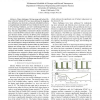Free Online Productivity Tools
i2Speak
i2Symbol
i2OCR
iTex2Img
iWeb2Print
iWeb2Shot
i2Type
iPdf2Split
iPdf2Merge
i2Bopomofo
i2Arabic
i2Style
i2Image
i2PDF
iLatex2Rtf
Sci2ools
ASPDAC
2016
ACM
2016
ACM
Modeling, analysis, and optimization of Electric Vehicle HVAC systems
Abstract— Major challenges of driving range and battery lifetime in Electric Vehicles (EV) have been addressed by designing more efficient power electronics, advanced embedded hardware, and sophisticated embedded software. Besides the electric motor in EVs, Heating, Ventilation, and Air Conditioning (HVAC) has been seen as a significant contributor to the EV power consumption. The main responsibility of automotive climate controls has been to control the HVAC system in order to maintain the passengers’ thermal comfort. However, the HVAC power consumption and its dynamic behavior may influence the battery lifetime and driving range significantly. Therefore, modeling and analyzing the HVAC system and its thermodynamic behavior may benefit the control designers to integrate the HVAC control and optimization into Battery Management Systems (BMS) for better battery lifetime and driving range. In this paper, the EV architecture, HVAC system dynamic behavior, and battery characterist...
ASPDAC 2016 | Hardware |
| Added | 29 Mar 2016 |
| Updated | 29 Mar 2016 |
| Type | Journal |
| Year | 2016 |
| Where | ASPDAC |
| Authors | Mohammad Abdullah Al Faruque, Korosh Vatanparvar |
Comments (0)

